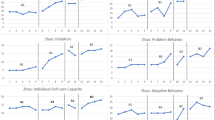Abstract
Objective
To validate effectiveness of low intensity, home based early intervention (EI) models in autism for countries with low disability resources.
Methods
Fifty-two toddlers and young children were assessed before and after intervention with Childhood Autism Rating Scale, Vineland Social Maturity Scale, and Receptive-Expressive Emergent Language Scale. Developmental and speech therapists helped mothers assemble low-cost training kits based on the developmental age of the child, gave initial training in the basic behavioral technique to address the three autism symptom clusters at home. Follow-up support was given either on a weekly, fortnightly or monthly basis. Most of the children were also placed in play-schools. Data was analyzed using appropriate bivariate and multivariate techniques.
Results
There was statistical and clinical amelioration in the severity of autism, with acquisition of social skills and language skills (all P = 0.001) after intervention in children with mild to severe autism. Gender showed a trend in becoming a significant predictor for intervention response.
Conclusions
Low-intensity, home-based EI can be effectively used in situations where there is paucity of disability resources in countries like India, especially in primary-care and community settings.
Similar content being viewed by others
References
Dingfelder HE, Mandell DS. Bridging the research-to-practice gap in autism intervention: an application of diffusion of innovation theory. J Autism Dev Disord. 2011;41:597–609.
Sallows GO, Graupner TD. Intensive behavioral treatment for children with autism: four-year outcome and predictors. Am J Ment Retard. 2005;110:417–38.
Handleman JS, Harris SL. Preschool education programs for children with autism. 3rd ed. Austin, TX: PRO-ED; 2008.
Reichow B. Overview of meta-analyses on early intensive behavioral intervention for young children with autism spectrum disorders. J Autism Dev Disord. 2012;42:512–20.
Freitag CM, Feineis-Matthews S, Valerian J, Teufel K, Wilker C. The Frankfurt early intervention program FFIP for preschool aged children with autism spectrum disorder: a pilot study. J Neural Transm. 2012;119:1011–21.
Bibby P, Eikeseth S, Martin NT, Mudford OC, Reeves D. Progress and outcomes for children with autism receiving parent-managed intensive interventions. Res Dev Disabil. 2002;23:81–104.
Dawson G, Rogers S, Munson J, Smith M, Winter J, Greenson J, et al. Randomized, controlled trial of an intervention for toddlers with autism: the Early Start Denver Model. Pediatrics. 2010;125:e17–23.
Meadan H, Ostrosky MM, Zaghlawan HY, Yu SY. Promoting the social and communicative behavior of young children with autism spectrum disorders: a review of parent-implemented intervention studies. Top Early Child Spec Educ. 2009;29:90–104.
Schopler E, Reichler RJ, Renner BR. Childhood Autism Rating Scale. Los Angeles: Western Psychological Services; 1988.
Doll EA. A Genetic Scale of Social Maturity. Am J Orthopsychiatry. 1935;5:180–8.
Bzoch KR, League R. Assessing language skills in infancy. Baltimore: University Park Press; 1971.
Birnbrauer JS, Leach DJ. The Murdoch Early Intervention Program after two years. Behav Chang. 1993;10:63–74.
Welterlin A, Turner-Brown LM, Harris S, Mesibov G, Delmolino L. The home TEACCHing program for toddlers with autism. J Autism Dev Disord. 2012;42:1827–35.
Juneja M, Mukherjee SB, Sharma S, Jain R, Das B, Sabu P. Evaluation of a parent-based behavioral intervention program for children with autism in a low-resource setting. J Pediatr Neurosci. 2012;7:16–8.
Laugeson EA, Frankel F, Gantman A, Dillon AR, Mogil C. Evidence-based social skills training for adolescents with autism spectrum disorders: the UCLA PEERS program. J Autism Dev Disord. 2012;42:1025–36.
Acknowledgments
The authors gratefully acknowledge the cooperation and support received from staff of Child Development Centre, Kerala, specially Dr. G. Suresh Kumar, Registrar; Ms. Deepa N.R., PS to Director; Mr. Asokan N, PA to Director; Ms. Suja S, Junior Programmer; CDC, Medical College, Thiruvananthapuram, in conduction of this study.
Conflict of Interest
None.
Source of Funding
This study is supported by Child Development Centre, Thiruvananthapuram.
Author information
Authors and Affiliations
Corresponding author
Appendix
Appendix
Rights and permissions
About this article
Cite this article
Nair, M.K.C., Russell, P.S.S., George, B. et al. CDC Kerala 9: Effectiveness of Low Intensity Home Based Early Intervention for Autism Spectrum Disorder in India. Indian J Pediatr 81 (Suppl 2), 115–119 (2014). https://doi.org/10.1007/s12098-014-1474-8
Received:
Accepted:
Published:
Issue Date:
DOI: https://doi.org/10.1007/s12098-014-1474-8




